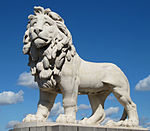Statue of Robert Clayton
Buildings and structures completed in 1714Grade I listed buildings in the London Borough of LambethGrade I listed monuments and memorialsMarble sculptures in the United KingdomMonuments and memorials in London ... and 4 more
Monuments and memorials removed during the George Floyd protestsOutdoor sculptures in LondonSculptures of men in the United KingdomStatues in London

The statue of Robert Clayton stands at the entrance to the North Wing of St Thomas' Hospital, Lambeth, London. The sculptor was Grinling Gibbons, and the statue was executed around 1700–1714. Sir Robert was a banker, politician and Lord Mayor of London. As President of St Thomas', he was responsible for the complete rebuilding of the hospital, and associated church in the late 17th century. The statue was designated a Grade I listed structure in 1979.
Excerpt from the Wikipedia article Statue of Robert Clayton (License: CC BY-SA 3.0, Authors, Images).Statue of Robert Clayton
Westminster Bridge Road, London Lambeth (London Borough of Lambeth)
Geographical coordinates (GPS) Address Phone number Website Nearby Places Show on map
Geographical coordinates (GPS)
| Latitude | Longitude |
|---|---|
| N 51.4992 ° | E -0.1201 ° |
Address
St Thomas' Hospital
Westminster Bridge Road
SE1 7EH London, Lambeth (London Borough of Lambeth)
England, United Kingdom
Open on Google Maps








